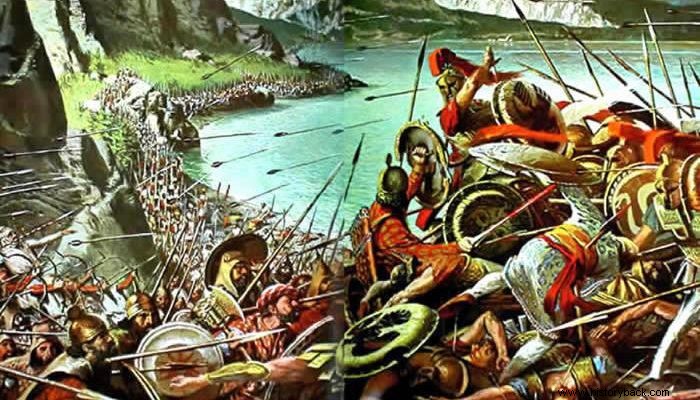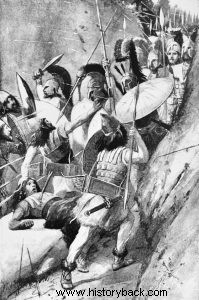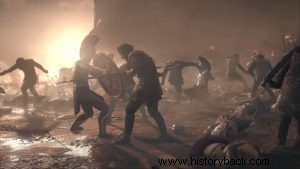
The battle of Thermopylae is a catalytic conflict in world history. It is an eternal example of bravery and self-sacrifice. Thermopylae is intertwined with the name of Leonidas and the 300 Spartans. However, in the final fight the Spartans were not alone. The early sources do not agree on either the initial or final strength of the Greeks who fought and fell at Thermopylae. You consider the presence of 900 Helots followers of the 300 likely, while the presence of 700 Thespians and perhaps as many of their followers is documented.
The main protagonist of the battle was undoubtedly the king of Sparta Leonidas . Leonidas was about 60 years old at the time of the battle, having been born in 540 BC. Despite his advanced age, he did not hesitate for a moment to be put in charge of the allied Greek force that would hold Thermopylae. He himself said the famous "Molon Lave" (come and take them) to the Persians when they asked him to lay down his arms.
When Leonidas was informed that the Persians would surround them, he expelled all his other soldiers, determined to remain himself and the 300 (with their followers?) in Thermopylae acting as a rear guard. With him, of their own accord, 700 Thespians decided to remain, from the small town of the same name in Boeotia. With him, Leonidas kept 400 Thebans by force, says Herodotus.
This last piece of information is checked because it would have been rather difficult and dangerous for Leonidas to forcefully hold 400 hoplites under control at the time he was preparing to fight the final battle. Herodotus reports that the Thebans surrendered but even this would not be so easy amid the confusion of the battle and the slaughter.
As for the Thespians, their leader was Demophilus, son of Diadromos. The Thespians voluntarily decided to die on the side of the Spartans. When the rest of the Greeks finally left, Leonidas, instead of limiting himself to passive defense, carried out a raid with his few men against the Persian hordes. The Greeks fought like lions, literally. Leonidas was killed fighting and a Homeric battle was fought around his dead body. Four times the Persians went to seize his body, four times the Spartans and Thespians took it back.
The Greeks fought with spears. When these were broken they fought with swords, then with shields, helmets, with stones, with sticks, with their hands, with their teeth... Finally, surrounded, they retreated to the hill of Colonus where they all fell fighting to the end for the Honor and Freedom of Greece.
According to Herodotus, the Spartan Dienekis was particularly distinguished in this final conflict. . He, before the battle began, utterly scorning death, when someone mentioned that the Persians were so numerous that if they shot their arrows they would cover the sun, he had replied:Very well, then we will fight in the shade! Dienekis normally should not have participated in the battle as all the Spartans who went to fight had to have a son to continue their line... Dienekes had no son, but he had a slave girl lie that she had borne him a son. Thus only he was allowed to participate. Dienekis distinguished himself throughout the battle until the end, when he defended the body of the king of Leonidas against thousands of enemies, before he too fell fighting.
Herodotus also highlights the bravery of two Spartan brothers, Alpheus and Maronos , sons of Orsiphantos, while mentioning the name of Dithyrambus separately , son of Armatidis, from Thespies. He fought just as bravely to the end, with Demophilus, the leader of the Thespians, taking command at the end. , son of Diadromos.
Of the 300, at least one man was rescued, possibly a second. The first was Aristodemus which due to patients, together with Eurytus , had withdrawn from the conflict. Eurytus, however, almost blind, returned to the battle and died fighting. Aristodemus returned to Sparta and lived in general disrepute until the battle of Plataea. At Plataeus he atoned with his blood fighting heroically and seriously injured. Later he is said to have fought the Persians again. A second survivor out of the 300, Panditis, is also mentioned , who had been sent by Leonidas to Thessaly. He could not bear the shame of living while his fellow warriors had so gloriously and committed suicide.
The dark protagonist of the battle was Nightmare Eurydimou, from Trachina (today's Heraklia of Fthiotida). Ephialtes, whose name became synonymous with treachery over the centuries, led the Persians to the backs of the Greeks for a huge monetary reward. The Delphic Amphictyonia proclaimed him and years after the battle a fellow citizen killed him. Some sources also mention Onitis as a traitor from Evia and Korydallos from Antikyra. However, these sources are not documented.
Finally, Gorgo deserves a special mention , the wife of King Leonidas to whom the famous phrase "It was then or on" (or with it – the shield – or on it). When Leonidas was leaving for battle Gorgo asked him what he should do if he was killed. The answer was:"Marry a good man and have good children". Another quote attributed to Gorgo is her response to an Athenian woman's question as to why Spartan women have authority over men. Gorgo replied:"Because only Spartan women give birth to men."


